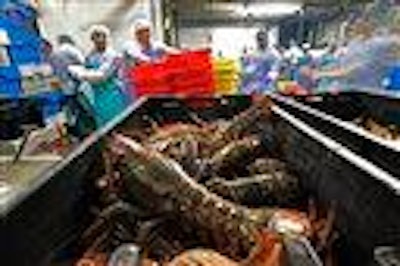
SACO, Maine (AP) — America's lobster industry is sending less of its catch to Canada as processing grows in New England, and the growth could have widespread ramifications for consumers who are demanding more lobster products every year.
U.S. lobstermen, clustered in the coastal New England states, have long sent a large amount of their catch to Canada's Maritime Provinces, where some two dozen companies process millions of pounds of lobster meat every year into everything from vacuum-sealed lobster meat packages to lobster pate. The processed lobster ends up in products like lobster ravioli and lobster pot pie that are growing in popularity with consumers.
But the dynamics of the processing industry are slowly changing. America exported about 69 million pounds of lobster to Canada in 2014, and the 2015 figure was less than 67 million, federal data show.
The trend comes as the lobster catch is booming, enabling the growth in processed lobster products. American fishermen set a record for lobster catch in 2012 and nearly topped it the following two years.
More processing plants in Maine are providing a way for fishermen to sell their lobsters locally rather than export, and Massachusetts lawmakers might change laws to allow more processing in their state. The processing growth could ultimately democratize the notoriously expensive lobster by making lobster products more available and affordable.
"Processors are creating more markets; more markets create greater opportunity for additional channels for lobster products to be sold," said Luke Holden, president of Luke's Lobster and owner of Cape Seafood, a processor in Saco, Maine.
Maine's lobster meat processing industry barely existed 25 years ago, slowly grew to five companies in 2010 and now includes 15 firms that processed about 20 million pounds of meat in 2013. Voters agreed to help pay for more growth through a 2014 referendum to dedicate $7 million in public money to Maine seafood and lobster processing.
In Massachusetts, where the lobster industry and some state leaders see the possibility of creating a bigger lobster-processing sector, the state Senate approved a bill in January that updates state laws to permit processing, sales and transportation of cooked and frozen in-shell lobster parts.
New England's processing industry remains dwarfed by Canada's. Companies in provinces including New Brunswick and Nova Scotia processed about 150 million pounds of lobster in 2013.
But leaders in Canada's industry have noticed the U.S. growth. Jerry Amirault, president of the Lobster Processors Association of New Brunswick and Nova Scotia, said he anticipates more competition between the U.S. and Canada for lobsters to process.
"We believe with the growth in the U.S. industry, increased demand takes place," he said. "There's going to be a competition for that resource."
The slight drop in lobster exports to Canada can be attributed to more factors than just processing growth, such as the supply of lobsters and the weak Canadian dollar, said John Sackton, an industry analyst and publisher of Seafood.com.
But domestic processing growth is important because it reduces shipping costs, which are eventually borne by the consumer, lobstermen have said. Processing growth is also important because of the trend toward processed lobster products and the importance of branding them as local to New England, some said.
"Restaurants are adding lobster in many ways. Lobster mashed potatoes, lobster mac and cheese," Sackton said. "The growth in the industry is going to be very much in that direction."






















